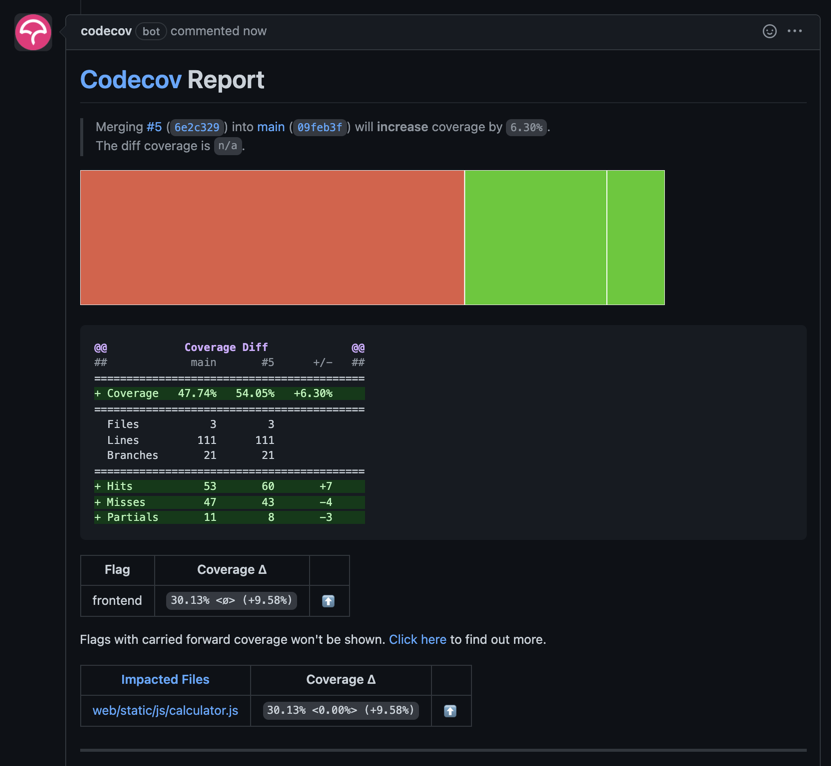6 - Test what you change with Carryforward Flags
Although Flags can help separate out different test suites, not every project will run the entire test suite for every commit. Carryforward Flags can be used here to maintain consistent coverage values.
Update CI workflows to run on applicable changes
Pull the latest from main and create a new branch step6
git checkout main
git pull
git checkout -b 'step6'Let’s set up our demo repository to only run workflows if the affected code is changed.
GitHub Actions
Edit the on: section of both workflows
...
on:
push:
paths:
- 'api/**'...
on:
push:
paths:
- 'web/**'CircleCI
Running jobs based on files changed in a directory requires CircleCI's path-filtering orb and dynamic config.
Due to this issue, be sure to replace <<pipeline.parameters.test-api-job>> and <<pipeline.parameters.test-frontend-job>> with <<pipeline.parameters.test-api-job>> and <<pipeline.parameters.test-frontend-job>> , respectively.
You will need toenable dynamic config.
version: 2.1
setup: true
orbs:
path-filtering: circleci/[email protected]
workflows:
jobs:
- path-filtering/filter:
mapping: |
api/.* test-api-job true
web/.* test-frontend-job trueversion: 2.1
orbs:
codecov: codecov/[email protected]
parameters:
test-api-job:
type: boolean
default: false
test-frontend-job:
type: boolean
default: false
jobs:
test-api:
docker:
- image: cimg/python:3.10.2
name: Install requirements
command: pip install -r api/requirements.txt
- run:
name: Run tests and collect coverage
command: pytest --cov --cov-report xml .
- codecov/upload:
flags: backend
test-frontend:
docker:
- image: cimg/node:17.6.0
steps:
- checkout
- run:
name: Install requirements
command: cd web && npm install
- run:
name: Run tests and collect coverage
command: cd web && npm run test
- codecov/upload:
flags: frontend
workflows:
test-api-workflow:
when: << pipeline.parameters.test-api-job >>
jobs:
- test-api
test-frontend-workflow:
when: << pipeline.parameters.test-frontend-job >>
jobs:
- test-frontendNow, if we make a change to only code in the web directory, the frontend workflow will run.
Add coverage to the frontend
Let’s add a test to our calculator.
...
test('test operation', () => {
const calculator = new calc.Calculator();
calculator.chooseOperation('+');
expect(calculator.operation).toBeUndefined();
calculator.appendNumber(1);
calculator.appendNumber(2);
calculator.chooseOperation('+');
expect(calculator.currentOperand).toBe('');
expect(calculator.operation).toBe('+');
expect(calculator.previousOperand).toBe('12');
calculator.appendNumber(3);
calculator.appendNumber(4);
expect(calculator.currentOperand).toBe('34');
expect(calculator.operation).toBe('+');
expect(calculator.previousOperand).toBe('12');
})
...Run cd web && npm run test to ensure that the test has been added in correctly.
Turn Flags into Carryforward Flags
Finally, we will need to make a change to our codecov.yml file to ensure that Flags are marked as Carryforward.
...
flag_management:
default_rules:
carryforward: true
...Commit and push your changes to GitHub.
git add .
git commit -m 'step6: add Carryforward Flags'
git push origin step6Notice that only the frontend workflow runs. In the Flag section of the Codecov comment, you will only see the frontend Flag.

Conclusion
At this point, you have worked through the major features of Codecov. From here, you can explore other advanced aspects of the product.
Updated about 2 months ago